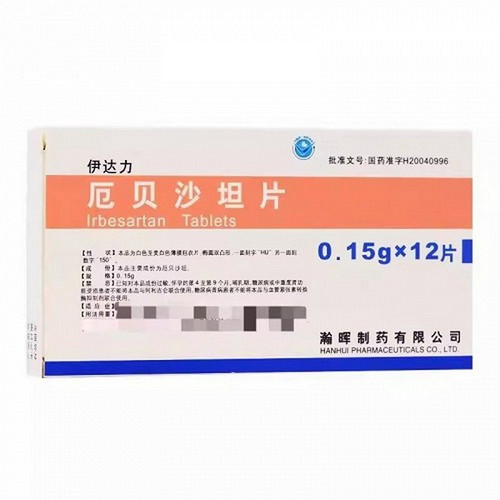Product Overview
[Drug Name]
Generic Name: Irbesartan Dispersible Tablets
Trade Name: Pida
English Name: Irbesartan Dispersible Tablets
Chinese Pinyin: Irbesartan Dispersible Tablets
[Ingredients]
The main ingredient of this product is irbesartan. Chemical name: 2-butyl-3-[[o-1H-5-tetrazolylphenyl]benzyl]-1,3-diazepine.
[Properties]
This product is white or off-white tablets.
[Indications]
Treatment of essential hypertension.
[Dosage and Administration]
The recommended initial and maintenance dose is 150 mg daily. Dietary considerations are not important. Generally, 150 mg of irbesartan once daily provides better 24-hour blood pressure control than 75 mg. However, for certain patients, particularly those undergoing hemodialysis and those over 75 years of age, a 75 mg initial dose may be considered.
[Adverse Reactions]
Not yet known.
[Contraindications]
1. Contraindicated in patients allergic to this product. 2. Contraindicated in pregnant and lactating women. [Precautions] Volume-depleted patients: Patients with volume depletion due to taking potent diuretics, strict salt restriction in their diet, or diarrhea and vomiting may experience symptomatic hypotension when taking this product, especially during the first dose. These conditions should be corrected before starting this product. Renovascular hypertension: Patients with bilateral renal artery stenosis or stenosis of the artery to a single functioning kidney are at increased risk of severe hypotension and renal insufficiency when using drugs that affect the renin-angiotensin-aldosterone system. Although this has not been observed in studies with this product, similar effects of angiotensin II receptor antagonists should be considered when using this product. Renal impairment and renal transplantation: When using this product in patients with renal impairment, regular monitoring of serum potassium and creatinine is recommended. There is no experience with the use of this product in patients who have recently undergone renal transplantation. Hypertensive Patients with Type 2 Diabetes and Kidney Disease: Analyses of studies in patients with advanced renal disease showed inconsistent effects of irbesartan on renal and cardiovascular events across all subgroups. In particular, women and non-white populations appear to benefit less from irbesartan. Hyperkalemia: As with other drugs that affect the renin-angiotensin-aldosterone system, hyperkalemia may occur with irbesartan, particularly in patients with renal impairment, overt proteinuria due to diabetic nephropathy, and/or heart failure. Close monitoring of serum potassium levels is recommended in these patients. Lithium: Coadministration of irbesartan with lithium is not recommended. Aortic and mitral stenosis, hypertrophic obstructive cardiomyopathy: As with other vasodilators, caution should be exercised when using irbesartan in patients with aortic and mitral stenosis and hypertrophic obstructive cardiomyopathy. Primary Aldosteronism: Patients with primary aldosteronism generally do not respond to antihypertensive drugs that inhibit the renin-angiotensin system. Therefore, irbesartan is not recommended in these patients. General Precautions: For patients whose vascular tone and renal function depend primarily on the activity of the renin-angiotensin-aldosterone system (such as those with severe congestive heart failure or renal disease, including renal artery stenosis), treatment with ACE inhibitors or ARBs that affect this system has been associated with acute hypotension, azotemia, oliguria, or, rarely, acute renal failure. As with any antihypertensive drug, excessive blood pressure lowering in patients with ischemic cardiomyopathy or ischemic cardiovascular disease may lead to myocardial infarction or stroke. As with ACE inhibitors, irbesartan and other ARBs are significantly less effective in lowering blood pressure in blacks than in non-blacks. This may be due to the higher prevalence of low renin levels in hypertensive patients in blacks.
[Use in Special Populations]
Precautions for Pediatric Use:
There are currently no data on the safety and efficacy of this drug in children.
Precautions for Pregnancy and Lactation:
This drug is contraindicated in pregnant and lactating women. Elderly Precautions:
Although an initial treatment dose of 75 mg is recommended for patients over 75 years of age, dose adjustment is generally not required for elderly patients.
[Drug Interactions]
Diuretics and Other Antihypertensive Drugs: When this product is used concomitantly with other antihypertensive drugs, its antihypertensive effect may be enhanced. However, this product can be safely used concomitantly with other antihypertensive drugs such as long-acting calcium channel blockers, beta-blockers, and thiazolidine diuretics. High-dose diuretics used prior to the initial use of this product may increase volume depletion and the risk of hypotension. Potassium Supplements and Potassium-Sparing Diuretics: Based on clinical experience with other drugs that affect the renin-angiotensin system, the concomitant use of potassium-sparing diuretics, potassium supplements, potassium-containing salt substitutes, or other drugs that increase serum potassium levels (e.g., heparin sodium) can lead to increases in serum potassium and is therefore not recommended. Lithium: Reversible increases in serum lithium and toxic effects have been reported when lithium is coadministered with angiotensin-converting enzyme inhibitors.
[Pharmacological Action]
Irbesartan is a potent, orally active, selective angiotensin II receptor (AT1 subtype) antagonist. It is believed to block all AT1 receptor-mediated effects of angiotensin II, regardless of the source or synthetic pathway of angiotensin II. Its selective antagonism of the angiotensin II receptor (AT1) results in elevated plasma renin and angiotensin II levels and decreased plasma aldosterone levels. When administered alone at the recommended dose, irbesartan does not significantly affect serum potassium in patients without electrolyte imbalances. Irbesartan does not inhibit angiotensin-converting enzyme (ACE or kinase II), which generates angiotensin II, nor does it degrade bradykinin to inactive metabolites. Irbesartan's activity does not require metabolic activation.
[Storage] Keep sealed.
[Specification] 0.15g
[Packaging] 0.15g x 10 tablets
[Expiration Date] 24 months
[Approval Number] National Medicine Standard H20110024
[Manufacturer] Weifang Zhongshi Pharmaceutical Co., Ltd.






